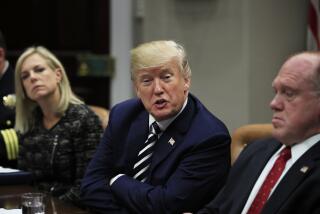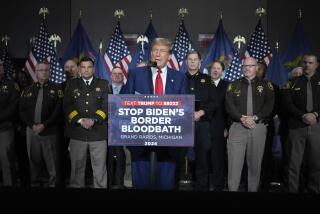Trump links New York bomb attack to immigration debate
President Trump cited the suspect in the New York subway bombing on Monday as an argument for his crackdown on legal as well as illegal immigration, after the administration said the man entered the country in 2011 on a family immigrant visa.
“Today’s attempted mass murder attack in New York City — the second terror attack in New York in the last two months — once again highlights the urgent need for Congress to enact legislative reforms to protect the American people,” Trump said in a statement.
Much remained unclear about the background of the suspect, identified by police as Akayed Ullah, 27, who was injured in the apparent suicide bombing attempt. White House Press Secretary Sarah Huckabee Sanders asserted that the attack could have been prevented if the U.S. had canceled the ability of American citizens to sponsor relatives for visas, which the president calls chain migration.
“We know that the president’s policy calls for an end to chain migration, which is what this individual came to the United States through,” Sanders said. “And if his policy had been in place, then that attacker would not have been allowed to come in the country.”
U.S. citizens are allowed to sponsor siblings for lawful permanent residency; those siblings, if admitted, can ask to bring their children. Sanders said the suspect was admitted through what is known as an F43 family immigrant visa, a type usually given to the children of siblings of U.S. citizens.
Trump called that policy “incompatible with national security.”
The explosion was in an underground passage in Midtown Manhattan at the start of the morning commute. The suspect, who was quickly taken into custody, was burned on his hands and abdomen. Three people near the blast sustained minor injuries, authorities said.
Trump also cited the attack in pressing for other policies, including his ban on travel to the United States by people from eight countries. Those nations do not include Bangladesh, which was Ullah’s native country, according to an administration official.
Separately, Trump is at odds with Democrats in Congress over whether to protect from deportation hundreds of thousands of people brought to the country illegally as children. Although he has said he wants to devise protections for the so-called Dreamers, replacing the Obama-era program he is ending, Trump is demanding that any agreement also include measures cracking down on immigration.
It is not the first time that Trump has quickly seized on a terrorist attack, in this country or abroad, to argue for his immigration agenda. Yet the president’s reaction contrasts with his response after violence involving American nationals.
After mass shootings in Las Vegas in October and then at a Texas church in November elicited calls for gun controls, Trump and Sanders said it was too soon to talk policy in the immediate aftermath of the tragedy. The president was widely criticized in August when he delayed and equivocated in denouncing white supremacists after deadly violence in Charlottesville, Va. At the time, Trump said that, unlike other politicians, he did not like to weigh in on news events before taking time to learn all the facts.
Twitter: @noahbierman
More to Read
Get the L.A. Times Politics newsletter
Deeply reported insights into legislation, politics and policy from Sacramento, Washington and beyond. In your inbox three times per week.
You may occasionally receive promotional content from the Los Angeles Times.








